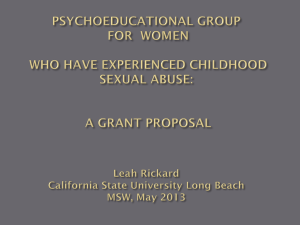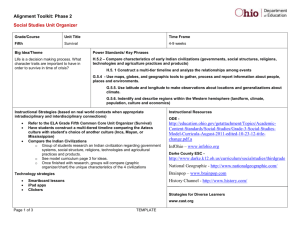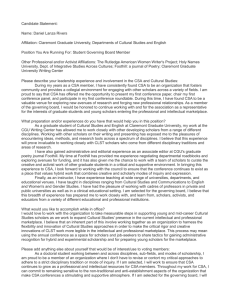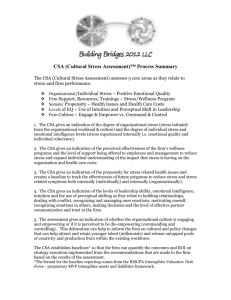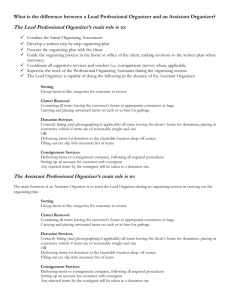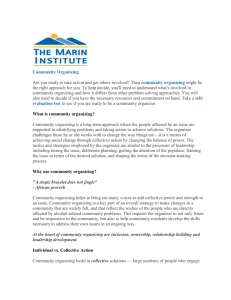My background as a community organizer and radical theorist
advertisement
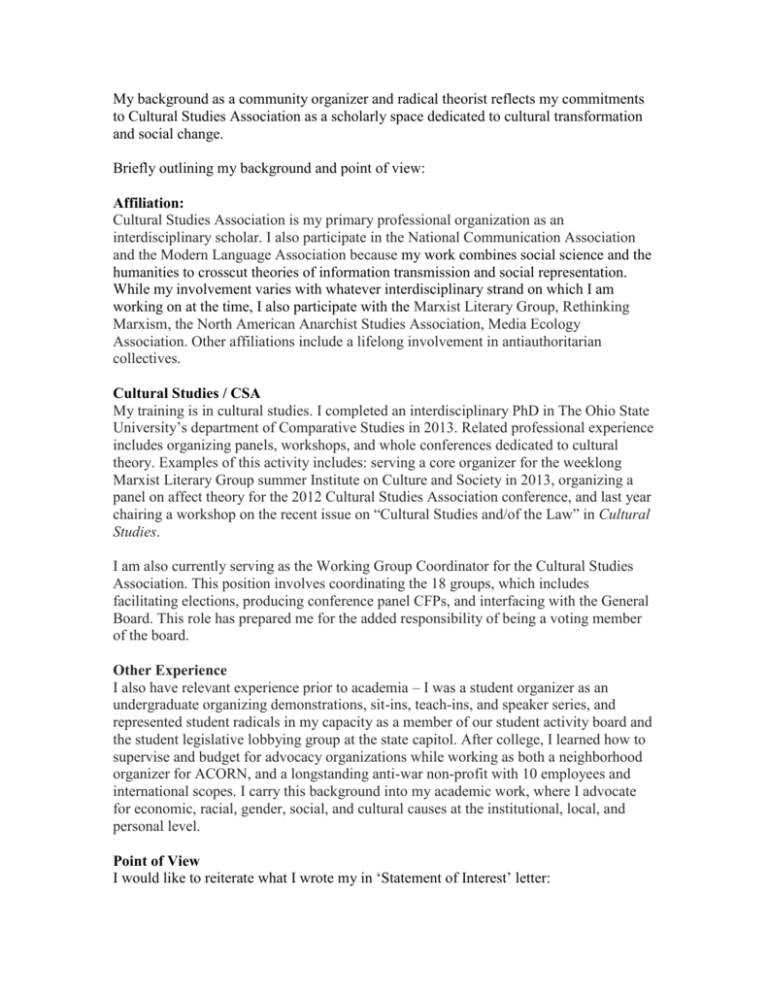
My background as a community organizer and radical theorist reflects my commitments to Cultural Studies Association as a scholarly space dedicated to cultural transformation and social change. Briefly outlining my background and point of view: Affiliation: Cultural Studies Association is my primary professional organization as an interdisciplinary scholar. I also participate in the National Communication Association and the Modern Language Association because my work combines social science and the humanities to crosscut theories of information transmission and social representation. While my involvement varies with whatever interdisciplinary strand on which I am working on at the time, I also participate with the Marxist Literary Group, Rethinking Marxism, the North American Anarchist Studies Association, Media Ecology Association. Other affiliations include a lifelong involvement in antiauthoritarian collectives. Cultural Studies / CSA My training is in cultural studies. I completed an interdisciplinary PhD in The Ohio State University’s department of Comparative Studies in 2013. Related professional experience includes organizing panels, workshops, and whole conferences dedicated to cultural theory. Examples of this activity includes: serving a core organizer for the weeklong Marxist Literary Group summer Institute on Culture and Society in 2013, organizing a panel on affect theory for the 2012 Cultural Studies Association conference, and last year chairing a workshop on the recent issue on “Cultural Studies and/of the Law” in Cultural Studies. I am also currently serving as the Working Group Coordinator for the Cultural Studies Association. This position involves coordinating the 18 groups, which includes facilitating elections, producing conference panel CFPs, and interfacing with the General Board. This role has prepared me for the added responsibility of being a voting member of the board. Other Experience I also have relevant experience prior to academia – I was a student organizer as an undergraduate organizing demonstrations, sit-ins, teach-ins, and speaker series, and represented student radicals in my capacity as a member of our student activity board and the student legislative lobbying group at the state capitol. After college, I learned how to supervise and budget for advocacy organizations while working as both a neighborhood organizer for ACORN, and a longstanding anti-war non-profit with 10 employees and international scopes. I carry this background into my academic work, where I advocate for economic, racial, gender, social, and cultural causes at the institutional, local, and personal level. Point of View I would like to reiterate what I wrote my in ‘Statement of Interest’ letter: The Problem Cultural studies exists both as a field and a discipline in North America. Scholars from nearly all arts, humanities, and social science disciplines claim cultural studies as a field. There are advantages to this dispersion: there remains a micropolitics to the study of culture that each scholar addresses individually. For some, culture allows them to describe phenomenon otherwise ignored by the field. Others use culture to study mass society and transient forms. It is important to protect and expand scholars’ ability to perform this type of research. But beyond these methodological concerns: what draws me to cultural studies is that it singularly positions scholars to influence contemporary politics. My Point of View I want to bring two core positions to the Governing Board: (i) that cultural studies should take seriously its increasing institutionalization, and (ii) that cultural studies should act politically. (i) Cultural Studies as a Project I want cultural studies to define what its intellectual-political project is/should be. This is a question of its formal constitution. Is cultural studies a discipline, and as such, should there be PhDs, faculty lines, and departments of cultural studies? Is cultural studies simply an attitude, and as such, it should be limited to topical courses, journals, and conferences? Because cultural studies is being increasingly institutionalized, I want to spearhead a series of white papers. They would be collaboratively written, and discuss what formally constitutes cultural studies. Issues addressed may include: conventional requirements of scholarly recognition (common methodology, established canon), shared spaces of inquiry (professional affiliation, flagship journals, conference activity), and institutional gatekeeping (program justification, curricular significance, comprehensive exams). (i) Cultural Studies as Politics I want cultural studies to find a place/role in contemporary political engagement. This is a question of material practice. There is a micropolitics to cultural studies in how it negotiates the academy; that is, how it addresses issues of academic freedom, academic labor, and the role of politics in the academy. My contribution will be in-and-beyond these issues. I plan to create a space for encounters between activists and CSA membership. I have done this on a smaller scale for other academic organization, such as the MLG and NAASN. In my capacity as a member of the board, I want to produce unique types of intervention with CSA members collaborating with outsiders on artistic, social, and political interventions. The problems we face today are global in scale. Pervasive violence against women, racist imperialist wars, environmental devastation, and economic exploitation are all urgent issues, and they demand creative responses. If elected, I will advocate for a cultural studies that is not only aware of these issues, but also built to intervene in them – formally and materially. I appreciate your consideration and look forward our building the CSA together. Yours Sincerely, Andrew
